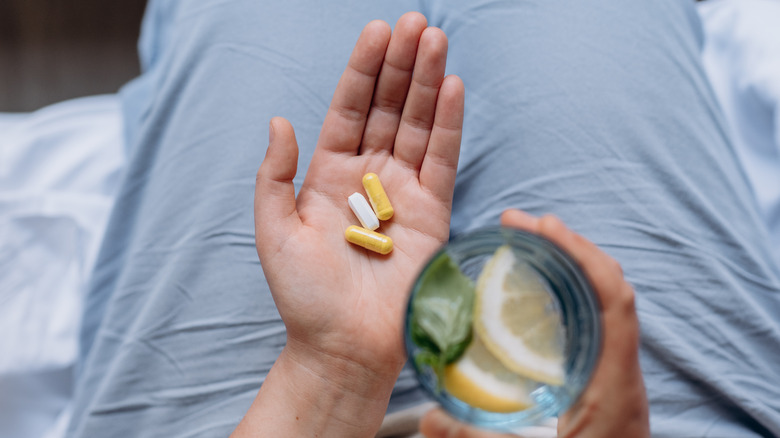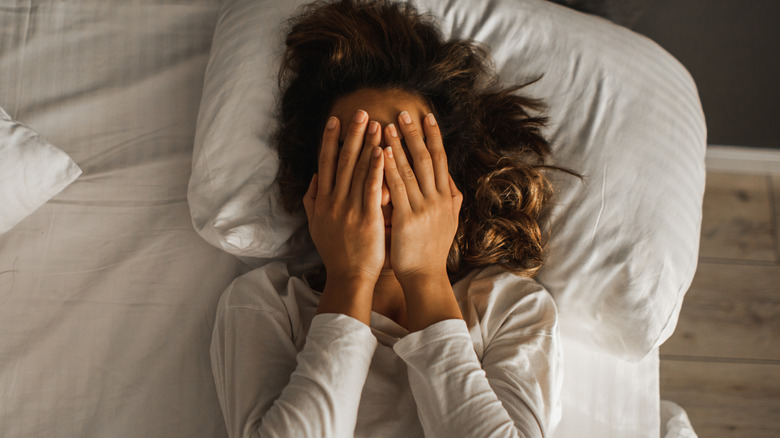What To Know Before Taking Magnesium And L-Theanine Together For Better Sleep
A quick glance down the sleep supplement aisle in a pharmacy could have you confused about which drugs, minerals, herbs, or amino acids are best to get a little more shuteye. Some medications like Benadryl and Unisom have antihistamines that can put you to sleep quickly. Melatonin doesn't necessarily make you sleepy, but it helps your body align to its sleep/wake cycle.
Magnesium can help you sleep by relaxing your muscles, especially when you're under a lot of stress. L-theanine is an amino acid that works on your brain to help you relax. Both these supplements can work independently, but you can combine them to help you sleep.
Although the magnesium-theanine stack hasn't been heavily studied, a 2022 study in Frontiers in Nutrition found that the combination can lower stress-related molecules and reduce nitric oxide levels that can lead to inflammation. Taking magnesium and L-theanine can also reduce overactive brain signals and increase slow wave activity necessary for deep sleep. Because this study was conducted on mice, it's unclear how much magnesium and L-theanine would have this same effect on humans. Too much of either magnesium or L-theanine can cause side effects or interactions with medications.
Side effects of too much magnesium or L-theanine
Over-the-counter stacks of magnesium and L-theanine (such as Natural Vitality's Calm Mind) can have 200 milligrams of magnesium and 200 milligrams of L-theanine. Although men need at least 400 milligrams of magnesium and women need 310 milligrams per day, you don't want to overdo it with magnesium supplements.
The National Institutes of Health suggests an upper limit of 350 milligrams for magnesium supplements. Taking too much magnesium in supplements can cause diarrhea, and people with kidney problems should avoid magnesium supplements. Some medications interact with magnesium supplements such as antibiotics, diuretics, calcium channel blockers, muscle relaxants, and bisphosphonates.
There aren't any established standards for L-theanine, but a 2015 review in the Journal of the American College of Nutrition suggests 200 milligrams of L-theanine to ease anxiety, improve sleep quality, and reduce waking up during the night. L-theanine doesn't cause side effects, even at higher doses. However, you should avoid L-theanine if you're taking medication for high blood pressure because L-theanine could lower your blood pressure.
Magnesium and L-theanine can't treat sleep disorders
Sleep supplements like magnesium and L-theanine can help your body and mind relax, but having chronic issues with falling asleep and staying asleep could be a sign of an underlying sleep disorder or poor sleep hygiene. You might not be aware of some of your daily habits that could be affecting your sleep. For example, that delicious latte you enjoy in the late afternoon could be keeping you up at night. Alcohol might help you fall asleep, but habitually drinking alcohol within three hours of bedtime could lead to waking up in the middle of the night or lower-quality sleep. Your phone or television could also keep your brain on high alert, making it tougher to fall asleep.
An occasional sleepless night is normal, but needing sleep aids stronger than magnesium or L-theanine could indicate a sleep disorder. If it takes more than 30 minutes for you to fall asleep each night, that could be a sign of a sleep disorder. Other symptoms of a sleep disorder include waking up (and remaining awake) several times through the night, falling asleep during the day, or needing caffeine or other stimulants to function during your day.


